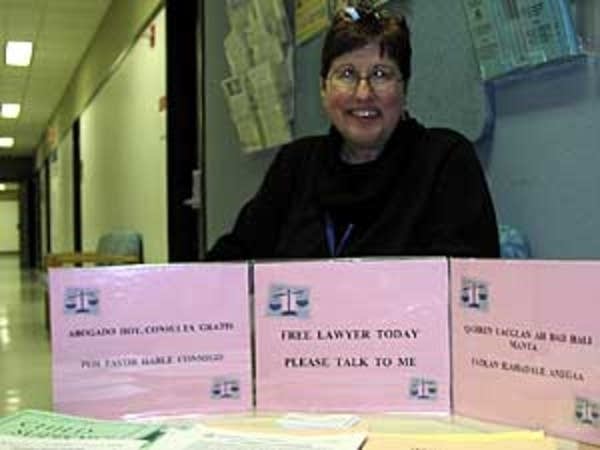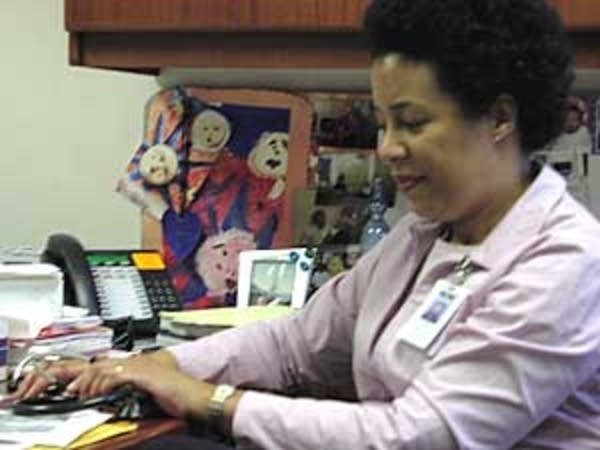Taking Legal Aid on the road to Hennepin County Medical Center

A grandmother we will call Clarice sits in an office at Hennepin County Medical Center with her teenaged daughter. The daughter is a statuesque 17-year-old whose baby has been sick. Clarice's daughter and grandson have been in and out of the hospital in the past two years. In an office just down the hall from the Pediatric Clinic, Monica Bogucki asks Clarice about her daughter's history.
"Tell me specifically what happened," says Bogucki.

"Well she was working in the summertime, in July last year 2005 and she took sick so she had to leave the job," says Clarice.
Bogucki is not a physician but a legal aid attorney. Clarice says the county cut off her daughter's government aid, including food stamps, five months ago because the girl stopped attending school. The state requires most teen parents attend school in order to receive aid. After meeting with Clarice and her daughter for about 45 minutes, Bogucki thinks that the daughter may still qualify for aid because she had good cause to miss school -- both she and her baby have been sick.
Create a More Connected Minnesota
MPR News is your trusted resource for the news you need. With your support, MPR News brings accessible, courageous journalism and authentic conversation to everyone - free of paywalls and barriers. Your gift makes a difference.
"People aren't being straight with you about what the law is," she says. "I've got to actually have got to go through and do some digging in the law too, kind of take the facts and take a look at the law and see what arguments we'll make."
Bogucki asks them to sign a release for the daughter and baby's medical records so she can get to work on the case.
For us, eight blocks in the winter months is not a big deal if we have a car and we can access busses regularly. But if someone has a family and doesn't have bus fare, trying to maneuver with children in the winter months is just cruel.
Legal Aid attorneys such as Bogucki do not work in a formal office at HCMC. For the past two years, they have set up shop every Wednesday afternoon in a hallway adjacent to the Pediatric Clinic. Their shop consists of a row of three chairs and a sign atop a small table that reads in English, Spanish and Somali -- "Free Lawyer Today; Please Talk to Me." When a client needs to talk privately, the lawyers borrow a vacant office.
Bogucki says legal aid has long prided itself on being accessible. She says many of its clients do not have adequate transportation and it can be easier for the attorneys to come to their clients rather than expecting clients to come to them.
"For us, eight blocks in the winter months is not a big deal if we have a car and we can access busses regularly. But if someone has a family and doesn't have bus fare, trying to maneuver with children in the winter months is just cruel," says Bogucki.
The idea of setting up a legal clinic in HCMC came after legal aid lawyers noticed they were getting many calls from HCMC workers with client referrals. The attorneys approached HCMC's Chief of Pediatrics Dr. Julia Joseph-DiCaprio. They asked about setting up the legal clinic and DiCaprio said, "Absolutely!"
DiCaprio says at first the connection between a family's legal problems and a child's health may not be clear. Living in substandard housing, for example, may worsen a child's asthma. The attorneys can take action against a landlord to make needed repairs. DiCaprio says the lawyers can help patients get the aid or assistance to which they are legally entitled.
"(For instance) If you're a young person and you have a chronic condition like diabetes and you don't know how to fill out the forms or how to get the forms to get health insurance. I've had young people who have gotten the services of this project and that has allowed them to get health insurance so that they're no longer afraid to come in and get care for their diabetes. And of course in the end, they end up healthier," says DiCaprio.

Meanwhile, Clarice the grandmother is just wrapping up her meeting with Monica Bogucki. Clarice has hit so many dead ends in trying to get the state aid restored that she looks a bit hesitant that Bogucki will succeed. Nevertheless, Clarice says she has hope and feels good about her session with an attorney:
"Because it's someone I can talk to, someone I can rely on and confide in and won't get the runaround and the wrong answer. I just gave it a try and this is what I got and we're down here talking to her and hopefully we can get something done," she says.
Other cities such as Boston and Rochester, N.Y. have similar legal programs in hospitals.
Legal Aid in Minneapolis says it has been averaging about 3 to 4 clients each Wednesday afternoon at the Hennepin County Medical Center.
